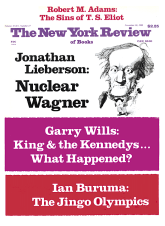In response to:
Twice-Told Tale from the April 23, 1987 issue
To the Editors:
Francis Russell’s review of Doris Kearns Goodwin’s book (The Fitzgeralds and the Kennedys) is outstanding even for The New York Review [NYR, “Twice Told Tales,” April 23, 1987]. Nevertheless, I feel that his discussion of the 1960 election both gives Nixon too much credit in one respect and too little in another.
To begin with the area where he gives Nixon too little credit, he says that Kennedy won “by plurality—not a majority—of the popular vote.” Due to the bizarre events in Alabama, it is not at all obvious that Kennedy had more popular votes than Nixon. Scammon shows the vote as follows:
Obviously, eight thousand voters getting six electoral votes while 324,000 got only five and 238,000 got none is absurd.
The year 1960 was a period in which the southern whites after a long long period of solid support of Democrats were beginning their shift into their present Republican voting in presidential elections. As a first step in that direction, a number of “true Democratic” movements were set up in the South, the purpose of which was to avoid endorsing the national Democratic candidates and at the same time not endorse the national Republican candidates. Alabama has a primary election for presidential electors. In that primary election a slate of anti-Kennedy electors won six of the eleven positions and five were won by the pro-Kennedy electors. The six anti-Kennedy electors then proceeded to carry on a vigorous and active campaign. The pro-Kennedy electors stayed home and said nothing. The ultimate outcome was 324,000 votes for all eleven Democratic electors. The anti-Kennedy electors received eight thousand more votes than the pro-Kennedy electors.
The popular vote is very difficult to disentangle. The above figures assume that the people who voted for all eleven of the electors were pro-Kennedy. Obviously, this is too simple, but what should be substituted for it is by no means obvious. I personally would suggest that we simply discard all these votes in the popular total on the grounds that we can’t tell what these voters thought. Another possibility would be to divide the popular vote cast for these eleven electors in the same ratio as the popular vote in the earlier primary. Either of these corrections would lead to Nixon having more popular votes nationally than Kennedy.
So much for giving Nixon more credit than Russell does. Let me now turn to where I think he gives him too much credit. Nixon chose not to contest the election, but I think this is less a “credible” effort to avoid another Hays-Tilden controversy, than a feeling that he would have lost. He was after all, a practical politician. There are two ways of cheating in an election, one of which is to miscount the ballots and the other is to insert false ballots. Apparently the Chicago Democratic machine had miscounted, but the ballots were still in their physical control and I feel sure that if the serious contest had been proposed, it would have been found that by the time that the inspectors got to the ballots they were in accord with the original count. The same would have been true in Texas. Thus, Nixon’s decision not to contest reflects less favorably on his morals and more on his practical political knowledge.
Gordon Tullock
George Mason University
Fairfax, Virginia
Francis Russell replies:
Whether Nixon was more prudent or magnanimous in not disputing the 1960 election can never be finally determined. Professor Tullock inclines to prudence; I tend for once to give Nixon credit for magnanimity. I am not sure Nixon himself knew. He later wrote that despite the urgings of prominent Republicans, he decided against demanding recounts in Illinois and Texas because “the organization of the new Administration and the orderly transfer of responsibility from the old to the new might be delayed for months. The situation within the entire Federal Government would be chaotic…. Then, too, the bitterness that would have been engendered by such a maneuver on my part would have done incalculable and lasting damage throughout the country.”
Given the Byzantine intricacies of Alabama politics, it is indeed possible that Nixon’s popular vote may have slightly exceeded Kennedy’s in that close election. Whereas in most states in a presidential election voters are given a single slate of Republican or Democratic electors to check off, Alabama Democratic voters could choose or reject individually from the list of electors, eleven separate choices. There must have been considerable vote-splitting in 1960, for an anti-Kennedy elector topped the list with 324,050 votes, trailed by a pro-Kennedy with 318,303 votes. This latter figure the Congressional Quarterly gives as the total Alabama Kennedy vote. The difference between the “anti” and the “pro,” the Quarterly tabulates as “Other.” The “Others” then, with some six thousand votes, take six electors whereas the Republicans with thirty times that total get no electors at all. This, as Professor Tullock points out, is an absurdity.
There is no tabulating the vote exactly, but for a reasonable approximation one can divide 318,303 by eleven, multiply it by five for the pro-Kennedys and by six for the anti-Kennedys. The Kennedy Alabama total would then be 144,685 instead of the Quarterly’s given 318,303. If we then deduct the 179,838 anti-Kennedy Alabama votes from the national total then Nixon did have a final 64,165 vote plurality in the 68,828,960 votes cast.
It is possible, and has happened, that candidates with a national popular majority have lost out in the Electoral College. But if the Electoral College votes had been as close in 1960 as in 1876, the six anti-Kennedy electors from Alabama would have decided the election. Would they then have chosen Kennedy or Nixon? No one knows.
This Issue
November 10, 1988



